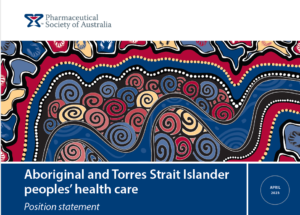WA’s pharmacists honoured with Excellence Awards
27 April 2023
The Pharmaceutical Society of Australia (PSA) has recognised Western Australia’s top pharmacists as part of the 2023 PSA Excellence Awards tonight in Perth.
Awards were presented to the following pharmacists:
The WA Pharmacist of the Year was awarded to Laura Stewart MPS.
Laura’s vision is to ensure pharmacists are able to practise to their full scope and are recognised for their key role in healthcare. Working in Pilbara and Gascoyne regions of WA, known to have significant health workforce shortages, Laura has been able to thrive by expanding the team to now include 16 pharmacists, as well as 2 interns.
To help create developmental pathways, Laura has invested heavily Intern and Student accommodation. Free housing along with passionate mentoring, leadership and training has seen Laura create a thriving culture where the entire team mirrors her drive and service levels. The Pilbara region is now a pharmacy placement destination that is highly coveted.
Laura has formed strategic partnerships with numerous professional bodies including universities to help stimulate & drive student placement opportunities. Laura also regularly engages with the community through various forums such as seminars, workshops or career vocation days.
The WA Early Career Pharmacist of the Year was awarded to Ayomide Ogundipe MPS.
Ayomide is a practicing pharmacist and academic, undertaking a Doctor of Philosophy at Curtin University investigating pharmacists’ adoption of technologies with a view to pharmacists’ advanced clinical services.
Through her involvement in sessional teaching at Curtin University, Ayomide aims to inspire students with her research-informed, practice-informed approach to learning. In turn, Ayomide is inspired by how they embrace health technologies. She believes that this helps make a difference in how her students graduate with technological literacy and enthusiasm for their emerging careers as future users and adopters of technology.
Ayomide looks to further utilise universities in implementing messaging and training for the next generation of pharmacists. She also serves on the PSA Standard Review Group for the review of the Professional Practice standards.
The WA Intern of the Year was awarded to Keiran Batavia MPS.
Keiran is an engaged and exemplary early career pharmacist and has demonstrated strong leadership initiative as an Intern pharmacist. Through Keiran’s internship at Pharmacy 777 Applecross, he engaged in various professional services. Whilst juggling his internship responsibilities, Keiran demonstrated strong engagement with the Branch committee and willingness to work collaboratively with fellow interns and early career pharmacists to re-engage student, intern and early career pharmacists in the Western Australian contingent of the early career pharmacist CSI. Keiran shows excellent leadership potential, a willingness to learn and be involved, and an eagerness to bring others along on the journey.
The WA Lifetime Achievement was awarded to Professor Kevin Batty FPS.
Kevin’s 40-year career in Pharmacy spans hospital pharmacy, academic teaching and leadership, and research.
His research interests in pharmacokinetics and the pharmaceutical science of antimicrobial drugs are supporting practice change, improving treatments, and positively impacting the health of some of the most vulnerable in our population. Areas include drug stability and compatibility for administration in neonates, study of penicillin pharmacokinetics in Indigenous and Ethiopian children and adults with rheumatic heart disease, and the pharmacokinetics of antimalarial treatments.
Kevin graduated from the School of Pharmacy at the WA Institute of Technology (now Curtin University) and embarked on a career in hospital pharmacy, aspiring to become a Chief Pharmacist. However, when the opportunity to study a master’s degree at the University of Manchester UK as the recipient of a Rotary Scholarship arose, a different pathway began to evolve. Shortly after returning from the UK Kevin was enticed into research. After 10 years as a hospital pharmacist and completing his PhD Kevin moved into academia and research at Curtin University in Perth.
In 2014 Kevin was appointed as Professor and Head, School of Pharmacy, and then Head, School of Pharmacy and Biomedical Sciences when the schools were merged in 2018.
During his time in academic leadership positions, he has overseen a number of initiatives for both the advancement of early career Pharmacy academics in the formative years of their research careers, and for course review and inclusions to ensure graduates are ready for the evolving practice environment.
Throughout his career Kevin has demonstrated a strong commitment to the profession, to his research collaborators, and to teaching and learning excellence.
PSA WA President Lusi Sheehan MPS presented the awards and congratulated each of the winners on their achievement.
“These pharmacists have truly demonstrated the full scope of Pharmacy practice in their respective faculties, have travelled beyond the regular roads of pharmacy and are outstanding in the heart of our profession,” Ms Sheehan said.
“They commit 100% to their roles, are passionate in the future of pharmacy and are leaders of our profession. We are proud to call them “one of ours”.
“Congratulations to all the award winners.”
Media contact: Georgia Clarke

